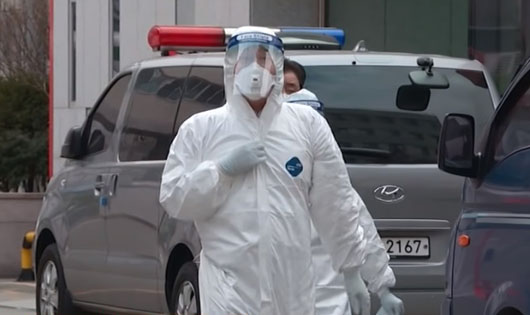by WorldTribune Staff, February 2, 2020
China’s communist party regime is facing perhaps its biggest crisis yet in the coronavirus outbreak, reports say.
The death toll could be much higher than reported according to a report by Hong Kong-based news outlet Initium Media, which alleged the Chinese Communist government is secretly cremating victims of the Wuhan coronavirus to keep the death toll down.

Yahoo News Australia reported that a Chinese nurse posted a video last week in which she claimed the real number of infections is ten times as high as the figure reported by the Chinese government. After asserting that over 90,000 people have actually been diagnosed with the Wuhan virus so far, the nurse pleaded for people around the world to send masks and other protective equipment to China to slow the spread of the disease.
The Communist Party is intent on limiting the political fallout from the government’s handling of the outbreak and reportedly cracking down on negative media coverage and social media commentary by threatening anyone who breaches their rules with up to seven years in jail.
In South Korea, leftist President Moon Jae-In is being criticized for seemingly prioritizing China over the welfare of South Korean citizens.
While others, including several U.S. airlines, have suspended flights to and from China, the Moon administration has not. “Rather, the Moon administration has been telling the citizens that there is no need to be overly concerned, if they follow the preventive measures like washing hands,” Tara O noted in a Feb. 1 report for East Asia Research Center.
On Sunday, the Moon administration announced measures to limit the entry of all foreigners who had visited Hubei Province, China, in the past 14 days.
On Jan. 28, the Hankyung newspaper reported that 124 South Korean soldiers who had been deployed to China for “battlefield training” were quarantined and returned earlier than planned to South Korea due to the Wuhan virus outbreak.
“South Koreans discovered the fact that the South Korean forces were deployed to China, and questioned why they were in China in the first place and exactly what field training they were conducting,” Tara O noted. “It is also interesting that all services and the Ministry of National Defense participated in the exercise.”
Tara O’s report also noted that media outlets around the globe have referred to the coronavirus as “Wuhan Virus,” “Wuhan Coronavirus,” and “China Pneumonia,” but the Moon administration in Seoul “implored journalists to use the term ‘new type of coronavirus.’ ”
As news of the virus spread, South Korea quickly donated 3 million masks, 100,000 protective suits, and 100,000 protective goggles to China “while at the same time, South Koreans are facing medical mask shortages,” Tara O noted. “It is expected that the domestic production of masks will be disrupted starting the first week of February, especially because the filters for the masks are made in China, and China has banned the export of the filters.”
The South Korean media have focused on the government’s efforts to responsibly deal with the crisis. “The virus has quickly emerged as a key test of the Moon administration’s crisis management capacity,” Do Je-Hae noted in a Sunday report for Korea Times. “Failure to properly deal with the virus could dent the public’s trust.”
In South Korea, the virus has already started to show some negative impact on public sentiment toward the Moon administration and the ruling Democratic Party of Korea (DPK). The latest survey on Jan. 31 said Moon’s job approval rating had fallen to 41 percent. Support for the DPK had decreased to 34 percent, down 4 percentage points from the previous week.
There are at least 11 confirmed cases of coronavirus in South Korea, reports say.
Although China’s propaganda machine works to stifle any negative coverage of the Wuhan outbreak, the crisis is seen by many as a major blow to Chinese supreme leader Xi Jinping, “who has portrayed China as a responsible world power amid heightened tensions with the U.S. and other Western countries,” the Wall Street Journal reported.
The World Health Organization has declared the coronavirus a global emergency.
Reports say that more than 300 people have died from the virus and over 14,000 have been infected. The first death from the virus outside of China, in the Philippines, was reported on Saturday.
“Xi’s leadership style has effectively instilled a ‘wait and see’ attitude within the bureaucracy,” said Jude Blanchette, a China specialist at the Center for Strategic and International Studies, a Washington think-tank. That, he said, “is leading to slow and hesitant responses from government officials as they wait for pronouncements from Beijing before taking action.”
On Wednesday, Chinese authorities issued an order for a news article that looked at the possible negative impact of the virus on China’s economy to be scrubbed from the Internet.
The communist government is also cracking down on what it calls the spreading of “rumors” on Chinese social media about the virus. The government announced that anyone who tries to “disrupt social order” by posting on social media information about the virus from sources other than state-run propaganda outlets will face between three and seven years in jail.
